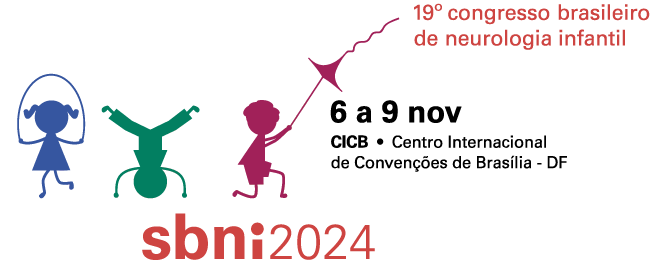Dados do Trabalho
Título
ETIOLOGICAL INVESTIGATION OF NEURODEVELOPMENTAL DISORDERS AND EARLY-ONSET MOVEMENT DISORDERS IN APAES
Introdução
Neurodevelopmental Disorders (ND) and early-onset Movement Disorders (MD) in childhood are common conditions that affect multiple areas of development, such as cognition and motor skills. Some of these disorders are progressive but potentially treatable. The clinical variability makes etiological diagnosis a challenge, and the resources for investigation in various regions of the country are limited and/or scarce.
Objetivo
Investigate possible genetic causes of ND and MD through Next-Generation Sequencing in a selected profile of patients from APAEs (Association of Parents and Friends of Exceptional Children) within Brazilian territory.
Método
Application of Next-Generation Sequencing using a panel of 91 genes already associated with ND and MD in saliva samples (collected via oral swab) from previously selected patients, without age restriction, with clinical criteria compatible with early-onset ND and/or MD.
Resultados
The study involves 116 APAEs distributed across all regions of the country. Samples from 286 patients from 11 APAEs have been analyzed so far. Seven pathogenic/probably pathogenic variants were found in genes commonly associated with intellectual disability and epilepsy (FOXG1, MECP2, PRRT2, GRIN2B, SLC2A1, SLC6A1, TBL1XR1). In addition to the variants in specific genes, four pathogenic CNVs (copy number variants) were identified: (del5p15.33, del5p13.3p14.1, del9q34.11, del16p11.2). These deletions include many genes and explain the clinical condition of the patients. In 10 patients, variants of uncertain clinical significance were identified, requiring further testing to determine their pathogenicity.
Conclusão
ND and MD present with variable and extensive clinical manifestations, which complicates etiological diagnosis and the implementation of potential specific treatments. Providing diagnostic tools that are cost-free and non-invasive enables intervention for potentially treatable cases, reduces comorbidities and complications, and facilitates genetic counseling. The implementation of genetic testing in APAEs allows access to diagnosis for patients throughout Brazil, including those in remote areas outside major urban centers.
Referências
1.Balakrishnan U. Inborn Errors of Metabolism—Approach to Diagnosis and Management in Neonates. Indian J Pediatr. julho de 2021;88(7):679–89.
2.MacNeill EC, Walker CP. Inborn Errors of Metabolism in the Emergency Department (Undiagnosed and Management of the Known). Emergency Medicine Clinics of North America. maio de 2018;36(2):369–85.
3.Saudubray JM, Garcia-Cazorla À. Inborn Errors of Metabolism Overview. PediatricClinics of North America. abril de 2018;65(2):179–208.
4.Zhang R, Qiang R, Song C, Ma X, Zhang Y, Li F, et al. Spectrum analysis of inborn errors of metabolism for expanded newborn screening in a northwestern Chinese population. Sci Rep. 29 de janeiro de 2021;11(1):2699.
5.Kruszka P, Regier D. Inborn Errors of Metabolism: From Preconception to Adulthood. INBORN ERRORS OF METABOLISM. 2019;99(1).
6.Wasserstein MP, Orsini JJ, Goldenberg A, Caggana M, Levy PA, Breilyn M, et al. The future of newborn screening for lysosomal disorders. Neuroscience Letters. agosto de 2021;760:136080.
7.Rajabi F. Updates in Newborn Screening. Pediatr Ann [Internet]. maio de 2018 [citado 12 de fevereiro de 2023];47(5).
8.Adhikari AN, Gallagher RC, Wang Y, Currier RJ, Amatuni G, Bassaganyas L, et al. The role of exome sequencing in newborn screening for inborn errors of metabolism. Nat Med. setembro de 2020;26(9):1392–7.
9.Bijarnia-Mahay S, Mishra R. Rapid Detection and Treatment of Inborn Errors of Metabolism in the Newborn Period: Beginning of a New Trend. Indian J Pediatr. maio de 2021;88(5):433–4.
10.Navarrete R, Leal F, Vega AI, Morais-López A, Garcia-Silva MT, Martín-Hernández E, et al. Value of genetic analysis for confirming inborn errors of metabolism detected through the Spanish neonatal screening program. Eur J Hum Genet. abril de 2019;27(4):556–62.
Palavras Chave
Distúrbios do neurodesenvolvimento; Transtornos do movimento; Sequenciamento de nova geração
Área
Neurogenética
Autores
ADA MARIA FARIAS SOUSA BORGES , GABRIELLE ROOS DIEHL , TAIS PIRES TERRA ARAÚJO , RENATA RIBEIRO DE SOUSA, ELIANE PEREIRA DOS SANTOS , JULIANA FORTE MAZZEU
